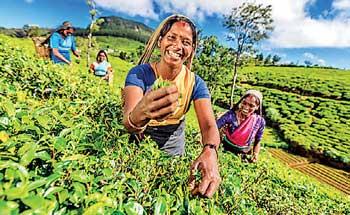Reply To:
Name - Reply Comment
Last Updated : 2024-05-18 13:30:00
By Nishel Fernando
 Despite the disappointing tea production in March this year, the Sri Lanka Tea Board (SLTB) is still hopeful of touching 260 million kilogrammes in production, with the roll out of the Rs.1.2 billion fertiliser subsidy scheme in the smallholder sector.
Despite the disappointing tea production in March this year, the Sri Lanka Tea Board (SLTB) is still hopeful of touching 260 million kilogrammes in production, with the roll out of the Rs.1.2 billion fertiliser subsidy scheme in the smallholder sector.
“It’s really difficult to say. We are hopeful of a positive year but I see after the positive start in January and February, we had a setback in March; it wiped off all good of January and February. The setback in March has put us back but I am still hopeful we will touch 260 million kilogrammes this year,” SLTB Chairman Niraj De Mel told reporters in Colombo yesterday.
Tea production declined by 12.20 percent year-on-year (YoY) to 19.57 million kilogrammes in March, due to the drought conditions prevailed in the tea growing regions. Consequently, the cumulative tea production declined by 2.26 percent YoY to 58.17 million kilogrammes, despite the growth in production in January and February.
De Mel predicted that a boost in production is possible in the third quarter of the year.
“Our heavy cropping months are about to start, which fall in the second half of three months,” he said.
The SLTB, with the guidance of the Agriculture and Plantation Industries Ministry, is also rolling out a Rs.1.2 billion fertiliser subsidy scheme to boost fertiliser application among the smallholders, who typically account for 70 percent of the country’s tea output.
“Fertiliser application among the smallholders has not been that good. The smallholder sector has been slow in line fertiliser. The Regional Plantation Companies (RPCs) did very well last year. That’s why we had a marginal increase last year,” he pointed out.
Sri Lanka’s tea output recovered by 4.20 million kilogrammes to 256.04 million kilogrammes in 2023 when compared to the previous year, from the detrimental policy decisions and adverse weather conditions. Sri Lanka nearly touched the 300 million kilogramme mark in tea production in 2021, before the ban on chemical fertiliser and agrochemicals came to impact the tea output.
Despite lifting the ban on chemical fertiliser and agrochemicals, high fertiliser prices were not affordable to the smallholders, due to the sharp depreciation of the rupee and combined rise in fertiliser prices globally, resulting in a slower pace of fertiliser application compared to the RPCs.
Under the scheme, De Mel shared that 30,000 MT of fertiliser would be distributed among the smallholders at subsidised prices. The first tranche of funds, amounting Rs.200 million, has already been released to Ceylon Fertiliser Corporation for this purpose.

Add comment
Comments will be edited (grammar, spelling and slang) and authorized at the discretion of Daily Mirror online. The website also has the right not to publish selected comments.
Reply To:
Name - Reply Comment
The state-run loss-making State Mortgage & Investment Bank (SMIB) has reveale
US authorities are currently reviewing the manifest of every cargo aboard MV
On March 26, a couple arriving from Thailand was arrested with 88 live animal
According to villagers from Naula-Moragolla out of 105 families 80 can afford